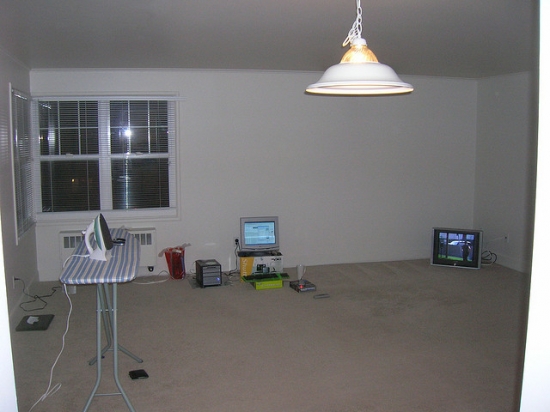
Photo Credit: http://www.flickr.com/photos/dnigh/59235633/sizes/z/in/photostream/
Ownership, Furnishings, Repairs, Taxes, Securities, Change of Ownership, Length of Rental are the subjects discussed in this article which is intended as general information and should not be deemed legal advice.
Renting an apartment seems like such a casual affair, especially if you’ve come from a country where rental complexes and professionally run rental buildings are the norm. In Israel, you will be dealing with a private landlord who is renting out an apartment or home which they likely purchased or held onto as an investment. This impacts the nature of the lease agreement in myriad ways, and tenants need to be very careful before entering into lease agreements in Israel
Ownership: Dealing with a private owner means that you, or an Israeli lawyer, must check that the person signing the lease is indeed the registered owner of the apartment and is entitled to rent it out. So, if you like an apartment, get the owner’s full name and Israeli ID number along with the Block/Parcel number of the apartment. Ownership can then be verified through the Israel Land Registry records (Tabu). Some typical issues to watch for are married owners, with one of them insisting that they can sign the lease with you while the husband/wife will add his/her name later. For all you know, the couple is in divorce proceedings, and the spouse that you haven’t met doesn’t agree to rent the apartment out. You want to make sure that the owners registered on title are those signing the lease with you, or that whoever is out of the country has provided a power of attorney for someone else to sign on their behalf. A similar problem could occur when a parent has passed away and an adult child living in Israel decides to rent out the apartment before Israeli probate has concluded who the lawful heirs are. If you find an apartment like this, a lawyer can verify the status of the probate and protect your rights as a tenant.
Furnishings: Another surprise in the Israeli rental market is learning the meaning of 'unfurnished'. Israeli 'unfurnished' translates as a barebones shell, with no closets, light fixtures, refrigerator, oven, dishwasher or washer/dryer. Since walk-in closets are not the norm in Israel, IKEA type wardrobes function as closets, and these are not fixtures so that owners will often move them to a new home. With that in mind, if you need appliances but have furniture, then look carefully at the 'partially furnished' apartments. It is important that the list of partial furnishing be included in the lease agreement so that if the owner is providing appliances, he/she will undertake to repair or replace an appliance if it breaks. This will often be a major point of contention as appliances are so expensive and owners usually do not want to deal with buying or repairing this sort of thing. For all these reasons it is critical that the lease agreement specify the appliances included and the responsibility for repairs.
Repairs: Repairs are often a difficult negotiating point in a lease agreement and this is an area in which you want to be sure that the lease agreement affords you protection should there be repairs. The Law of Leasing and Borrowing, 1971, contains provisions which apply to rentals if there is no lease agreement that applies. The overwhelming majority of owners will use lease agreements which have provisions that are far more favorable to them than the wording of the law. To protect your rights you would want a mechanism for notifying the owner of any damage, with the owner obligated to repair the damage within 24 – 48 hours at his/her expense. If the owner doesn’t repair, provisions allowing you as tenant to make the repair and set off the cost are practical, though owners will rarely agree to this. When the apartment owner lives outside Israel, a tenant’s right to set off the cost (deduct the cost of the repair from the rental) becomes even more important as the owner may not be around to make the repair or find the plumber or electrician that you need.
Taxes etc: Some of the other expenses that tenants pay include municipal taxes (Arnona), water, electricity, house committee payment (Vaad Bayit) and cable TV/Internet. Most lease agreements require the tenant to transfer the Arnona bill onto the tenant’s name for the duration of the lease, so that the tenant is responsible if they default. The house committee payment covers the maintenance of the building, and to protect the tenant, the lease should distinguish between routine house committee payments which the tenant pays, and special collections designed to repair or improve the building which the owner should pay.
Securities: The most unpleasant aspect of renting an apartment in Israel is the securities that the owner will demand of you. Although rental payments are typically monthly, the securities demanded can be onerous. There are three main types of securities that owners request: a bank guarantee, promissory note signed by yourself and two guarantors (who will need to provide pay stubs) and a personal check made out to the owner and postdated for the date of the expiration of the lease. Often, an owner will demand all three of these securities, and at the very least you can expect to provide two out of the three. These securities are designed to protect the owner in the event that the tenant moves out before the lease is up and doesn’t pay the rent, or moves out, leaving damage to the apartment.
Change of Ownership: An owner is allowed to sell the apartment while you are living in it as a tenant. The Law of Leasing and Borrowing, 1971, protects tenants in this scenario and you can complete your lease period. However, as a practical matter, you would be dealing with a new owner and the communication or method of handling repairs might change even if the lease agreement seems clear on these matters. On the flip side, you, as a tenant, will almost always be prohibited from subleasing, according to the terms of any lease agreement.
Other Legal Aspects: There are many other legal aspects to renting an apartment in Israel. Here is a brief list of the additional subjects that will be addressed in a lease agreement: insurance, breach of contract and penalties, return of securities, purpose of the rental (i.e. residential and not business), the option terms and how to exercise them, payment schedule and method of payment (bank deposit, check by mail), owner’s warranties as to electrical/plumbing, owner’s rights to enter apartment, tenant’s obligations to maintain apartment and refrain from disturbing neighbors, inventory (furnishings and appliances).
Length of Rental: For some tenants the most irritating aspect of the Israeli rental market is that it is virtually impossible to find a long-term rental. Since you are dealing with private owners, rental periods are typically one year, with an option if you request it. This translates into moving frequently since owners may decide to move back into their apartments, sell them, or gift them to their children. This is a reality of the Israeli rental market, so if your goal is long-term rental, try to find an owner who is willing to provide a long lease term at the outset. Good luck finding the perfect rental apartment and owner!
 ESRA College Netanya is reborn
ESRA College Netanya is reborn ESRA HERZLIYA ACTIVITIES
ESRA HERZLIYA ACTIVITIES Chanukah Celebration at ESRA Rishon LeZion
Chanukah Celebration at ESRA Rishon LeZion  A new website in English - on Volunteering - Launched in Israel
A new website in English - on Volunteering - Launched in Israel Help Needed for Abused Horses and Donkeys
Help Needed for Abused Horses and Donkeys Heather's Heseg
Heather's Heseg Deborah Opolion
Deborah Opolion